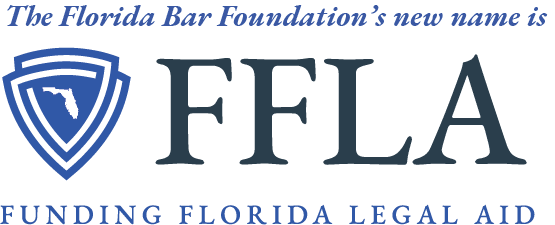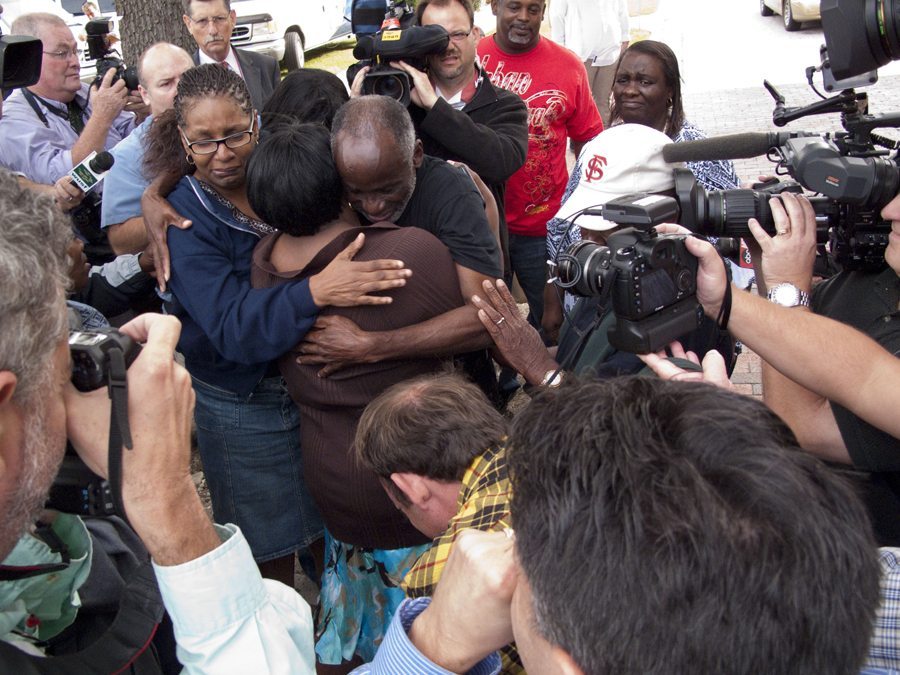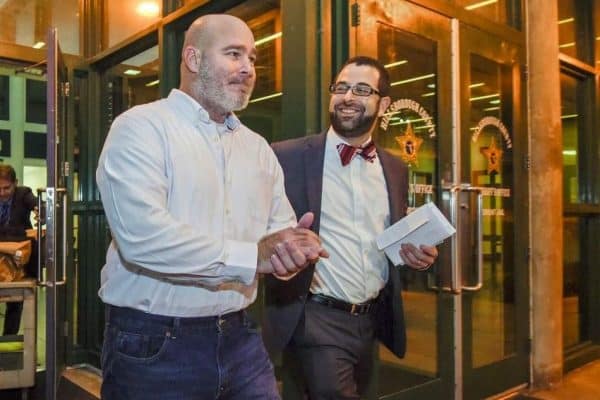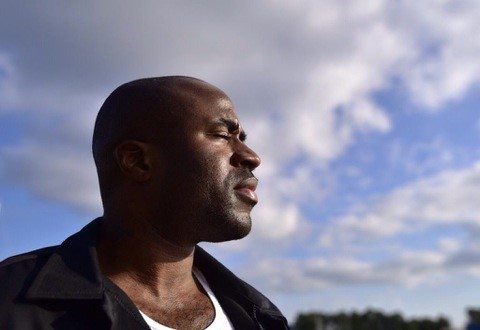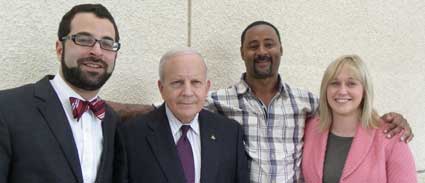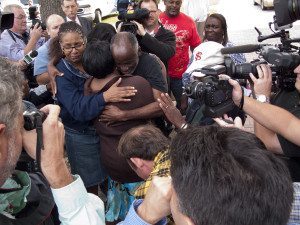
James Bain embraced his sisters on the steps of the Polk County Courthouse Dec. 17, 2009, the day he was released.
When James Bain embraced his sisters on the steps of the Polk County, Fla., courthouse on Dec. 17, 2009, as a free man for the first time in 35 years, he had served more time in prison than anyone ever exonerated through DNA testing.
On March 4, 2016, 42 years to the day since the rape for which he was wrongfully convicted, a 59-year-old Bain stood in a hotel meeting room inside Orlando International Airport and shared his story with the board of The Florida Bar Foundation, the organization whose funding made Bain’s exoneration possible.
Sharing the microphone with him was Seth Miller, executive director of the Innocence Project of Florida, which Miller modestly describes as “a small nonprofit criminal defense organization based out of Tallahassee.” With just two full-time attorneys including Miller, the Innocence Project of Florida litigates three to four dozen cases a year. In the last decade it has engineered the freedom of 15 men who collectively served more than 275 years in prison.
“None of this can happen without you,” Miller told the Bar Foundation board. “We have lots of funders, but The Florida Bar Foundation has been the principal funder of our project since our inception. We started out with a little bit of seed funding in 2004. You allowed us, with a very large grant a couple of years later, to expand our project from one and a half staff members to five staff members so we could actually litigate cases and get people out of prison. And what I think is unique about this is the consistent and dedicated commitment that you have made to us over time, and that we hope you will make to us in the future. You are our partners in this work. James Bain, all these clients, they are a product of our work together.”
In 1974, more than 10 years before DNA testing first became admissible in court, Bain had fallen asleep one evening while watching television with his sister. He awoke to find that police officers he knew from the neighborhood had come to his house to speak to him. Calmly, gently, they asked him to go with them to the police station “to clear up an issue.”
It would be three and a half decades before he’d see his home again.
Convicted at the age of 18 of raping a 9-year-old boy in Lake Wales, Fla., Bain fell victim to an error common to more than 70 percent of convictions overturned through DNA testing nationwide: eyewitness misidentification.
When a 2001 Florida statute allowed cases to be reopened for DNA testing, Bain turned to the only person he knew who might be able to help him – a fellow inmate.
“We have what we call the chain gang lawyers in prison,” Bain said. “And for them to fight your case you have to tell them about your case. I’m at-risk, because for anybody in prison in the United States and abroad, certain cases you just don’t want to explain or try to tell somebody in prison.”
Sharing with a fellow prisoner that you’ve been convicted of raping a child, Bain said, is to make yourself a target.
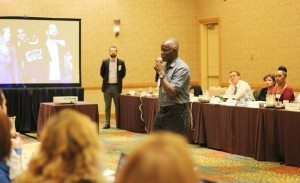
James Bain, who served 35 years in prison for a rape he did not commit, addressed The Florida Bar Foundation board March 4 along with Innocence Project of Florida Executive Director Seth Miller.
“But I’ve got to take the risk if I’m going to get out of here,” Bain said of his thinking at the time. “I must take that risk, because if I don’t give him his little canteen item for doing this paperwork, he’ll go tell anybody.”
With the help of another prisoner, Bain submitted four handwritten motions, and his case came before the court five times. It was denied five times. One inmate who tried to help him died in prison before Bain could get another hearing.
“And he took all the paperwork practically with him, so I got to start over,” Bain said.
Then, another inmate managed to get him a new hearing. As Bain awaited his hearing date, Miller sat on an airplane reading Florida Law Weekly and noticed a case that looked strange.
“So once the plane landed he called his staff members at the Innocence Project in Tallahassee and had them look into my case,” Bain said. “After those 35 years in prison and the way the justice system fought against us in there, ladies and gentlemen, from the first call I made with the Innocence Project in Tallahassee, less than eight months later I was released.”
Nearly all of the evidence in Bain’s case had been destroyed, and even the court transcripts had long since been shredded or sent to a landfill, but the victim’s boxers had somehow been neatly stored in a plastic evidence bag inside a manila envelope in Bartow for more than three decades.
“It’s a miracle,” Miller said. “It’s totally inconceivable.”
The perpetrator’s semen was on the boxers, and it did not come from James Bain.
As post-conviction innocence cases go, Bain’s was straightforward. But often, Miller and fellow litigator Melissa Montle face many more obstacles to proving someone’s innocence. DNA testing cost less than $5,000 in Bain’s case, but sometimes more advanced DNA testing is required and can cost up to $15,000.
View a List of Improvements in the Administration of Justice Grants
Recently, the Innocence Project of Florida had its first non-DNA exoneration in the case of Andre Bryant, another victim of eyewitness misidentification. Miller explained to the Bar Foundation board how one of the organization’s many student volunteers helped free Bryant, who was imprisoned for more than eight years for robbery at a Manatee County Walgreen’s.
“The surveillance video was presented at trial, yet it was put in the wrong machine, and it was very difficult to see,” Miller said.
The student located the right machine for playing back the tape, and the Innocence Project o f Florida then presented the digitally enhanced surveillance video and other evidence to the prosecutor.
“Without even fighting, they agreed to release our client. This is the new frontier of wrongful conviction work,” Miller said, to the applause of the Foundation board.
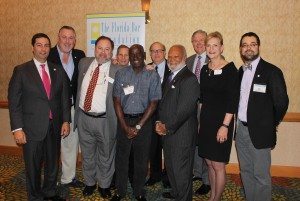
James Bain (pictured in the front fourth from the right) with the Florida Bar Foundation Board.
“What we’ve learned through our work is that DNA is only a component in about 10 percent of all criminal cases that move through the system, but yet the same things that cause wrongful convictions in those DNA cases – eyewitness misidentification, false confessions, bad lawyering, bad forensics, they cause wrongful convictions in all cases – the other 90 percent as well,” Miller said.
The Innocence Project of Florida has just hired a full-time investigator whose work will include gathering evidence and re-interviewing key witnesses and experts in non-DNA cases such as Bryant’s.
Miami criminal defense attorney David Rothman, immediate past chair of both The Florida Bar Criminal Law Section and the Innocence Project of Florida and Second Vice President of The Florida Bar Foundation, said his work with the project is one of the most rewarding aspects of his career.
“You feel the pride of being a lawyer and being able to help another human being who absolutely couldn’t help himself,” Rothman said.
The Florida Bar Foundation board approved a $255,000 grant for the Innocence Project of Florida for 2016-17, $10,000 of which is in the form of matching funds for an exoneree support fund.
“We don’t just get people out of prison and kick them out into a world that is totally different than the one that they left many years before,” Miller said. “We help people transition back into society and rebuild their lives.”
The Innocence Project of Florida is the first innocence organization in the nation to hire a full-time social worker, and one of only three today to employ one.
Help People Like James Bain: Give Now
Nearly seven years after his release, Bain is married with two children and works as a landscaper – a job the Innocence Project of Florida social worker helped him obtain – and he still speaks to the organization’s staff on a regular basis.
Sometimes it’s because he needs their help with something, but often it’s because they need him. He has become a leading advocate in the innocence movement, speaking all over the country and even internationally. He’s been to Germany three times to speak and appear on television, and he often attends conferences with Miller, whose son Gideon is 4, the same age as Bain’s son, James Jr.
It’s sometimes at these meetings, when Miller takes a brief pause from his 65-hour work weeks, that he realizes how his clients have put a stamp on his own life.
“For me, when I see my son and James’ son play together at a conference in the pool, I just sit there and say, ‘How unlikely is this?’ ”Miller said. “Not because our kids wouldn’t be friends in the abstract – they would – but because how unlikely is this moment, but for our work? But for our partnership with the Bar Foundation, this moment doesn’t exist.”
Read More Innocence Project Stories Join Us: Become a Fellow
